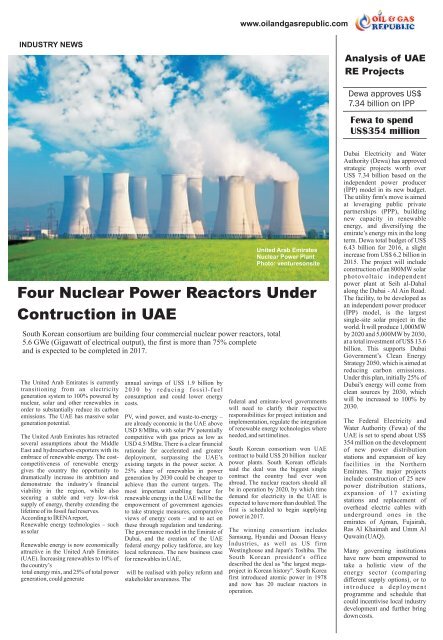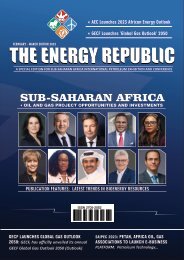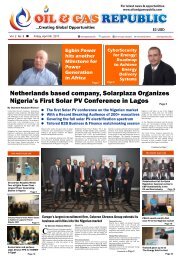Middle East Electricity & Solar 2017
Oil & Gas Republic is an exhibitor & media partner at Middle East Electricity & Solar 2017. This Newspaper publication is a spotlight on the Middle East Electricity & Power Sector. Middle East Electricity is an essential event in the MEA power community’s calendar, and the 2017 edition will be an unmissable opportunity for anyone with a professional interest to learn about the future of energy in cities. Informa Exhibitions is the organizer of Middle East Electricity & Solar 2017, one of the world’s leading power exhibitions. For more information, visit http://oilandgasrepublic.com
Oil & Gas Republic is an exhibitor & media partner at Middle East Electricity & Solar 2017. This Newspaper publication is a spotlight on the Middle East Electricity & Power Sector. Middle East Electricity is an essential event in the MEA power community’s calendar, and the 2017 edition will be an unmissable opportunity for anyone with a professional interest to learn about the
future of energy in cities. Informa Exhibitions is the organizer of Middle East Electricity & Solar 2017, one of the world’s leading power exhibitions. For more information, visit http://oilandgasrepublic.com
Create successful ePaper yourself
Turn your PDF publications into a flip-book with our unique Google optimized e-Paper software.
www.oilandgasrepublic.com<br />
INDUSTRY NEWS<br />
Analysis of UAE<br />
RE Projects<br />
Dewa approves US$<br />
7.34 billion on IPP<br />
Fewa to spend<br />
US$354 million<br />
Four Nuclear Power Reactors Under<br />
Contruction in UAE<br />
South Korean consortium are building four commercial nuclear power reactors, total<br />
5.6 GWe (Gigawatt of electrical output), the first is more than 75% complete<br />
and is expected to be completed in <strong>2017</strong>.<br />
The United Arab Emirates is currently<br />
transitioning from an electricity<br />
generation system to 100% powered by<br />
nuclear, solar and other renewables in<br />
order to substantially reduce its carbon<br />
emissions. The UAE has massive solar<br />
generation potential.<br />
The United Arab Emirates has retracted<br />
several assumptions about the <strong>Middle</strong><br />
<strong>East</strong> and hydrocarbon-exporters with its<br />
embrace of renewable energy. The costcompetitiveness<br />
of renewable energy<br />
gives the country the opportunity to<br />
dramatically increase its ambition and<br />
demonstrate the industry’s financial<br />
viability in the region, while also<br />
securing a stable and very low-risk<br />
supply of energy, thereby extending the<br />
lifetime of its fossil fuel reserves.<br />
According to IRENA report,<br />
Renewable energy technologies – such<br />
as solar<br />
Renewable energy is now economically<br />
attractive in the United Arab Emirates<br />
(UAE). Increasing renewables to 10% of<br />
the country’s<br />
total energy mix, and 25% of total power<br />
generation, could generate<br />
annual savings of US$ 1.9 billion by<br />
2 0 3 0 b y r e d u c i n g f o s s i l - f u e l<br />
consumption and could lower energy<br />
costs.<br />
PV, wind power, and waste-to-energy –<br />
are already economic in the UAE above<br />
USD 8/MBtu, with solar PV potentially<br />
competitive with gas prices as low as<br />
USD 4.5/MBtu. There is a clear financial<br />
rationale for accelerated and greater<br />
deployment, surpassing the UAE’s<br />
existing targets in the power sector. A<br />
25% share of renewables in power<br />
generation by 2030 could be cheaper to<br />
achieve than the current targets. The<br />
most important enabling factor for<br />
renewable energy in the UAE will be the<br />
empowerment of government agencies<br />
to take strategic measures, comparative<br />
views of energy costs – and to act on<br />
these through regulation and tendering.<br />
The governance model in the Emirate of<br />
Dubai, and the creation of the UAE<br />
federal energy policy taskforce, are key<br />
local references. The new business case<br />
for renewables in UAE,<br />
will be realised with policy reform and<br />
stakeholder awareness. The<br />
United Arab Emirates<br />
Nuclear Power Plant<br />
Photo: venturesonsite<br />
federal and emirate-level governments<br />
will need to clarify their respective<br />
responsibilities for project initiation and<br />
implementation, regulate the integration<br />
of renewable energy technologies where<br />
needed, and set timelines.<br />
South Korean consortium won UAE<br />
contract to build US$ 20 billion nuclear<br />
power plants. South Korean officials<br />
said the deal was the biggest single<br />
contract the country had ever won<br />
abroad. The nuclear reactors should all<br />
be in operation by 2020, by which time<br />
demand for electricity in the UAE is<br />
expected to have more than doubled. The<br />
first is scheduled to begin supplying<br />
power in <strong>2017</strong>.<br />
The winning consortium includes<br />
Samsung, Hyundai and Doosan Heavy<br />
Industries, as well as US firm<br />
Westinghouse and Japan's Toshiba. The<br />
South Korean president's office<br />
described the deal as "the largest megaproject<br />
in Korean history". South Korea<br />
first introduced atomic power in 1978<br />
and now has 20 nuclear reactors in<br />
operation.<br />
Dubai <strong>Electricity</strong> and Water<br />
Authority (Dewa) has approved<br />
strategic projects worth over<br />
US$ 7.34 billion based on the<br />
independent power producer<br />
(IPP) model in its new budget.<br />
The utility firm's move is aimed<br />
at leveraging public private<br />
partnerships (PPP), building<br />
new capacity in renewable<br />
energy, and diversifying the<br />
emirate’s energy mix in the long<br />
term. Dewa total budget of US$<br />
6.43 billion for 2016, a slight<br />
increase from US$ 6.2 billion in<br />
2015. The project will include<br />
construction of an 800MW solar<br />
photovoltaic independent<br />
power plant at Seih al-Dahal<br />
along the Dubai - Al Ain Road.<br />
The facility, to be developed as<br />
an independent power producer<br />
(IPP) model, is the largest<br />
single-site solar project in the<br />
world. It will produce 1,000MW<br />
by 2020 and 5,000MW by 2030,<br />
at a total investment of US$ 13.6<br />
billion. This supports Dubai<br />
Government’s Clean Energy<br />
Strategy 2050, which is aimed at<br />
reducing carbon emissions.<br />
Under this plan, initially 25% of<br />
Dubai's energy will come from<br />
clean sources by 2030, which<br />
will be increased to 100% by<br />
2030.<br />
The Federal <strong>Electricity</strong> and<br />
Water Authority (Fewa) of the<br />
UAE is set to spend about US$<br />
354 million on the development<br />
of new power distribution<br />
stations and expansion of key<br />
facilities in the Northern<br />
Emirates. The major projects<br />
include construction of 25 new<br />
power distribution stations,<br />
expansion of 17 existing<br />
stations and replacement of<br />
overhead electric cables with<br />
underground ones in the<br />
emirates of Ajman, Fujairah,<br />
Ras Al Khaimah and Umm Al<br />
Quwain (UAQ).<br />
Many governing institutions<br />
have now been empowered to<br />
take a holistic view of the<br />
energy sector (comparing<br />
different supply options), or to<br />
introduce a deployment<br />
programme and schedule that<br />
could incentivise local industry<br />
development and further bring<br />
down costs.















